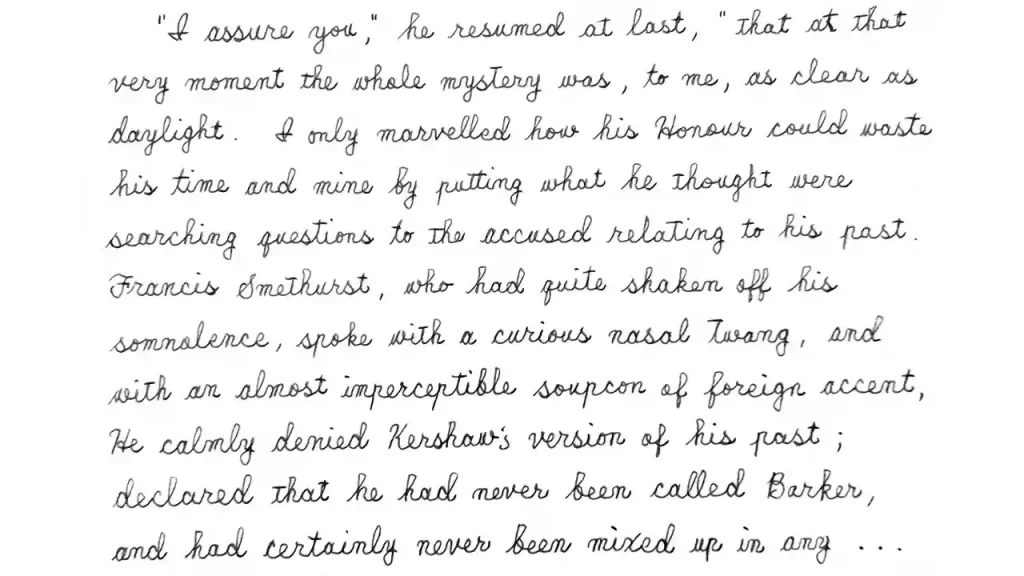“I assure you,” he resumed at last, “that at that very moment the whole mystery was, to me, as clear as daylight.
The Old Man in the Corner
- subject: そのミステリーのぜんよう
- predicate: あきらかとなる
コーナーの男がようやく話し始めました。
「その時、私には、そのミステリーの全容が明らかとなりました」
- 全容(ぜんよう, entirety)
- 明らか(あきらか, clear)
I only marvelled how his Honour could waste his time and mine by putting what he thought were searching questions to the accused relating to his past.
「私は驚きました。裁判長は、被告人の過去を疑って、時間を無駄にしたのかと」
- 裁判長(さいばんちょう, judge)
- 無駄(むだ, waste)
Francis Smethurst, who had quite shaken off his somnolence, spoke with a curious nasal twang, and with an almost imperceptible soupçon of foreign accent, He calmly denied Kershaw’s version of his past; declared that he had never been called Barker, and had certainly never been mixed up in any murder case thirty years ago.
- subject: スメサースト
- predicate: ひていする
「フランシス・スメサーストは、眠気を払い落していて、口を開きました。ごくわずかに外国なまりのある、変な鼻声で。
彼は自分の過去に関するカーショーの意見を静かに否定しました。自分はバーカーと呼ばれていなかったし、30年前の殺人事件に巻き込まれたことも無かったと」
- 否定(ひてい, denial)
- 巻き込まれた(まきこまれた, involved)
“‘But you knew this man Kershaw,’ persisted his Honour, ‘since you wrote to him?’
- subject: あなた
- predicate: しっている
「『しかし、あなたはカーショーを知っているでしょう。彼に手紙を書いたのだから』裁判長が繰り返し主張しました」
“‘Pardon me, your Honour,’ said the accused quietly, ‘I have never, to my knowledge, seen this man Kershaw, and I can swear that I never wrote to him.’
- subject: わたし
- predicate: あっていない
「『失礼ですが、裁判長。私の知る限り、私はカーショーと会っていません。私は彼に手紙を書いていないと誓えます』被告人が静かに言いました」
- 被告人 (ひこくにん, Defendant)
“‘Never wrote to him?’ retorted his Honour warningly. ‘That is a strange assertion to make when I have two of your letters to him in my hands at the present moment.’
「『彼に手紙を書いていない?』裁判長が念を押しました。『それは妙な主張だ。現在、私の手にはあなたの手紙が二通あるのに』」
- 妙な (みょうな, Strange)
- 主張 (しゅちょう, Claim)
“‘I never wrote those letters, your Honour,’ persisted the accused quietly, ‘they are not in my handwriting.’
- predicate: わたしの・ひっせきではない
「『私はその手紙を書いていません、裁判長』被告人が静かに主張しました。『それらは私の筆跡ではありません』」
- 筆跡 (ひっせき, Handwriting)
“‘Which we can easily prove,’ came in Sir Arthur Inglewood’s drawly tones, as he handed up a packet to his Honour; ‘here are a number of letters written by my client since he has landed in this country, and some of which were written under my very eyes.’
「『被告人の筆跡でないことを我々は簡単に証明できます』アーサー・イングルウッド弁護士が気取った口調で言って、裁判長に書類を手渡しました。
『こちらに私の依頼人がこの国に入国してから書いた何通かの手紙があります。そしていくつかの手紙は私の眼の前で書かれました』」
“As Sir Arthur Inglewood had said, this could be easily proved, and the prisoner, at his Honour’s request, scribbled a few lines, together with his signature, several times upon a sheet of note-paper. It was easy to read upon the magistrate’s astounded countenance, that there was not the slightest similarity in the two handwritings.
- subject: ひこくにん
- predicate: しょうめいする
「アーサー・イングルウッド弁護士が言った通り、これは簡単に証明できました。裁判長の要請で、被告人が数行の走り書きをしました。自身の署名をつけて、ノートのうえで複数回。
二つの筆跡に少しも類似点が無いという事は、裁判官の驚く表情から簡単に読み取れました」
Reference : The Old Man in the Corner by Baroness Orczy (project gutenberg)
English Story With Easy Japanese Translation
